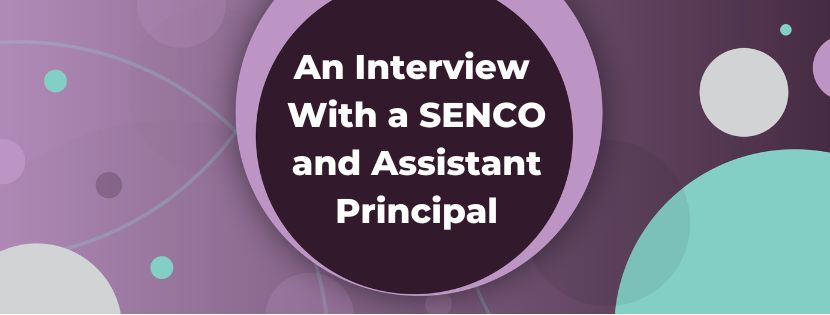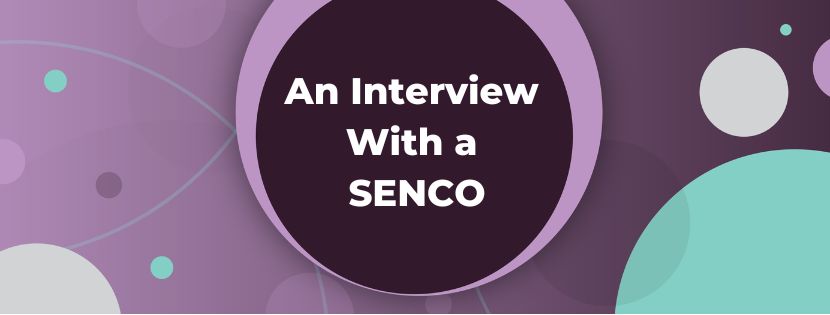
Unveiling the Role of a SENCO: Following the Career Journey of a SEND Professional
20 May, 20241-2 minutes
In this blog, you will learn:
- The many roles and responsibilities of a SENCO.
- Valuable lessons to keep up to date in the SEND industry as a SENCO.
- How to find and apply for the best SENCO jobs.
Considering a career as a Special Educational Needs and Disabilities Coordinator (SENCO), but unsure about the different challenges and responsibilities that come with the role? In this interview we unveiled the role and career journey of SENCO Abbie Simmonds who shared some valuable career tips and advice.
Abbie has worked as a qualified Teacher for over 15 years and began her career in a mainstream school. After realising that she really wanted to support children and young people with SEND in their education journey, Abbie made the decision to move to a specialist school and hasn’t looked back since.
Abbie has been a SENCO since 2021, and has also worked as an established Headteacher, helping to lay the foundations of a new independent special school. Abbie holds an National Professional Qualification for Senior Leadership (NPQSL) and a National Award for SEN Coordination (NASENCo).
With plans to return to senior leadership roles, Abbie is hopeful that she can continue to make an impact in the education and SEND sector.
Tell us about your career journey so far
I started as an English Teacher back in 2008 and found myself on a rapid career journey to Head of Drama by the end of my year as a Newly Qualified Teacher. As the years passed I realised that whilst I enjoyed my subject, my real interest was in making education accessible and enjoyable for all, particularly those displaying challenging behaviour.
I made the move into specialist schools full time in 2014. I supported a whole range of young people from KS2 to KS5 and learnt so much about disabilities and additional needs and how to support them in education.
I also began to do more at a whole school level, introducing new assessment systems and curricula, monitoring and tracking, and supporting child protection cases, whole school training and contributing to school improvement plans. I love problem solving and identifying issues or areas for development in systems and processes.
Tell me about the different roles you’ve had in your career
Learning more about the SEN system from the inside eventually led towards me becoming a SENCO. I recognised my ability to identify issues, find solutions as well as explain and simplify complex legal, diagnostic and education processes.
I gained my NASENCo after having been in post for a few terms, giving me a deeper, academic understanding of the complexities of disability, equality and inclusion.
In 2023, I was offered a position as the establishing Headteacher for a new independent special school run by a small company. I worked with two education consultants to develop all the necessary policies, procedures and curricula to enable us to successfully pass a pre-registration Ofsted inspection in the autumn of that year.
Although I ultimately made the choice to part ways with the company, I learnt an enormous amount and gained invaluable insight into the independent sector and local authority processes. I learnt how to build a school from scratch, from uniform to behaviour, teaching and learning approaches to therapists and Teachers.
It was a really wonderful experience to see a school emerge from nothing and I gained a thorough understanding of school standards and how to meet them.
It also reinforced my commitment to working for equality, inclusion and compassion in education. In 2024, I returned to a SENCO position on an interim contract to put my skills to good use.
What does your role as an interim SENCO consist of?
A SENCO’s role is incredibly varied and I consider it to be one of community and vision building. Put simply, I am responsible for the operational and strategic management of SEND provision across the school.
I am usually the most experienced SEN professional in the school and as such it’s my job to set the tone for inclusion, challenge where I see exclusion or inequality and to promote acceptance of and empowerment for all students with disabilities or additional needs.
From an operational standpoint, I manage the development and deployment of Teaching Assistants, manage interventions and identify special needs through assessment and data analysis. I also coordinate interventions for pupils, complete referrals, and write and manage education, health and care plans.
Strategically, I support the wider management team to ensure that the school is inclusive. This involves contributing to whole school improvement plans, working with middle leaders to develop inclusive practice and regular communication with the local authority special needs team.
On top of all of this, there are regular administration jobs such as updating central records, filing new reports on individual students and access arrangements for exams.
Finally, there’s actually teaching lessons and supporting young people when they are struggling alongside any personal training or development I need to undertake!
What does a typical day look like for you?
I get to work an hour before school starts to set myself up for the day. I fill in a briefing document to update my support team on the business of the day. This includes checking in with my assistant SENCO who manages the Teaching Assistant timetable, factoring in any staff absences and covering where necessary.
During tutor time, I often have scheduled parent meetings but if not I check my emails, update any admin jobs or work directly with students who need additional support to help settle them in for the day.
On a typical day I would be teaching for two or three lessons and the rest of the school day is taken up by learning walks, assessing students, management meetings or completing paperwork.
At the moment I have several Education, Health and Care Plan (EHCP) applications each of which take around 3 days to write. It can be challenging to find the time, alongside problem solving for students who may be emotionally dysregulated.
I meet with support staff at the end of the day to make sure everyone is ok and to address any problems that have arisen. Then there are curriculum meetings, staff training and pastoral meetings to attend, and the continuation of paperwork.
The paperwork can seem endless at times, but (much to my own surprise) I get a lot of satisfaction from a completed application or a spruced up spreadsheet!
I deal with an enormous amount of data and I am responsible for ensuring that others can navigate the relevant bits with ease. After school, when there are no new teenage dramas, is the best time to tackle the admin!
How do you keep up-to-date with changes in the SEND industry?
There’s a lot of noise in the SEND industry including endless adverts promising amazing improvements in learning and academic research and news reports and updates to keep on top of from official bodies and local authorities.
It’s important to choose your information channels carefully and to not be swayed by slick advertising or overly optimistic small scale research. I find the NASEN to be an invaluable resource for keeping up-to-date with key updates and I am signed up to the gov.uk for key governmental releases.
As a secondary SENCO I need to keep up to date with the Joint Council for Qualifications (JCQ) access arrangements, so I am also signed up to the Professional Association of Teachers of Students with Specific Learning Difficulties (PATOSS) for the latest news.
It’s important to be in touch with your local special needs team and SENCO forums. I make an effort to forge links with local parent and carer groups and charities to give me insight into local issues and provisions.
For ideas and sharing good practice, I enjoy podcasts and I am a regular listener to the SENDcast which I often recommend to my colleagues.
My most frequently used resource is probably social media; I am an active member of several SENCO forums online and find these invaluable to get advice, guidance and real-life experience of changes to the wider system.
What’s the most valuable lesson that you’ve learned in your career?
The most valuable lesson I have learned is the importance of compassionate communication. When you work in special schools, particularly where there may be medical needs, the relationship with parents changes.
I began to really listen to the stories the parents were telling me: of the struggles to get diagnoses, enduring painful medical appointments, fighting for adequate provision and the daily reality of supporting a child who was struggling.
Parents have a unique perspective on their child and other than the child themselves, they are the experts. I realised the importance of giving parents the space, time and attention they needed to share their perspectives and have their experience validated by a professional.
It takes an awful lot of time, energy and resilience to manage as a parent in the special needs system. They have often had negative experiences with professionals and I’ve worked with parents whose cries for help have been ignored, down-played or dismissed and so they have been forced to grow a hard outer shell so they can keep fighting for their child.
So, the most valuable lesson I have learnt is to listen with compassion to the lived experience of parents and students. Don't argue against, but accept their reality and work with them to achieve the best possible outcome.
How have things changed or progressed in the SEND sector since the start of your career?
Things have shifted a lot in the past few years, particularly since the SEND reforms in 2014. At the start of my career, the special needs department was quite separate from the rest of the school and there was absolutely no training in how to address different needs, outside of the odd session on dyslexia. A child’s special needs were shared briefly with us as main school teachers, but they weren’t really our concern.
Government guidance now states that every Teacher is accountable for the progress and development of SEN students in their class. Similarly, the SENCO has become a more strategic role that supports whole school provision, not just specialist interventions.
There has been a huge acceleration in our understanding of neurodiversity and disability in the last 20 years which has been a driving force in reforms and improvements to interventions and classroom teaching which has led to more acceptance and inclusion.
Unfortunately we are also seeing disproportionate numbers of children with additional needs experiencing severe mental illness and school avoidance, combined with a shortage in specialist provision and continuing inflexibility within mainstream schools. This highlights that we haven’t gone far enough to ensure that access to appropriate education is a reality for all.
What is the most challenging part of your job?
The most challenging part of my job is managing the feeling, and reality, that we cannot give every child what they need. I think it is this drive that can lead SENCOs to burnout. On a practical level we often do not have enough time to complete all our tasks, but even when we do we are working within a structure that is letting down our young people.
Schools and special needs in particular are underfunded, specialist provision is oversubscribed and many alternative provisions are inadequate. Due to benchmarks like Progress 8 and budgetary constraints, schools struggle to offer the flexibility required to be truly inclusive and the numbers of pupils that a single school has to accommodate makes supporting the 17% of SEN students and 0.4% of EHCP students a real challenge.
So even though I have worked incredibly hard, I have seen children be permanently excluded and for some of our most vulnerable, remain without education for months and even years.
I will never forget those children and I will never stop wondering if there is anything else I could have done. I have to remind myself that I am only ever a part of the story and can only do what I am able to do with the time and tools I have available.
What do you feel can be done to better support the needs of children and young people with SEND?
All children deserve the same attention, understanding and care. Some children require something slightly different, or may be more sensitive to an environment that works for most people, but they are no less deserving of the opportunity to learn and grow.
We need to take the time to find out who they are, what they need and then do what we can to create the optimum conditions for them to bloom into their own unique selves.
What would you say has been your biggest achievement?
I’m proud of a number of achievements over the years from building amazing teams of Teaching Assistants and Higher Level Teaching Assistants, to passing a pre-registration Ofsted on the basis of policies and procedures I designed.
Introducing new assessment and curricula in special schools and building up positive relationships with students and parents would certainly be included in my top 10. But truthfully, I think my biggest achievement lies ahead of me.
Do you have any tips or advice for anyone considering a career in SEND provision?
If you are interested in becoming a SENCO, join a forum on social media to get real insight into what we do, what we know, and what we don’t know! Don’t feel that you need to know everything about disability and differences.
SEND provision is complex and you will find yourself encountering all sorts of needs and disabilities. Just be open, curious and prepared to ask questions. Visit a special school or a SENCO and ask if you can shadow them for a day to get a real sense of what the job entails.
What are your plans for the future?
I want to work in senior leadership, ideally an Assistant Headteacher role for inclusion in secondary schools where I can put my knowledge, understanding and leadership skills to good use.
I’m really interested in school improvement; my dream job would be to work across several schools, supporting SENCOs and leadership teams to create inclusive and outstanding provision for all children.
SENCO jobs
If you’re searching for your next SENCO job, why not take a look at the latest vacancies, or simply upload your CV to be notified when a relevant position becomes available.
SENCO recruitment services
As specialist local authority SEND recruiters, we support local authorities and schools nationwide with their temporary, interim and permanent staffing needs.
If you’re struggling to recruit, we have exclusive access to some of the most experienced SENCOs in the UK.
If you’re struggling to fill a vacancy, why not get in touch with one of our team to see how we can help?
Share your experience
Every individual brings a unique set of experiences, thoughts, and insights to the table. We believe in giving a voice to a community of professionals to inspire positive change and champion reform in the SEND sector.
If you work in the SEND sector and would like to share your own personal and professional experiences, we’d love to hear from you. Perhaps you have a different perspective, could offer a fresh angle, or want to challenge assumptions.
Simply reach out to our Head of Content, Nicole Sherwood, to discuss a collaboration which makes your voice count.
Who is Spencer Clarke Group?
Established in 2017, we’re a vibrant and progressive recruitment agency based in the heart of the North West.
We continually reimagine the recruitment process to challenge convention and defy expectations; from creating a better recruitment experience to remodelling employee engagement, we thrive off doing things differently and turning heads along the way.
We operate in two sectors:
In eleven specialisms:
Healthcare, Social Care & Nursing
Corporate Functions & Business Support



